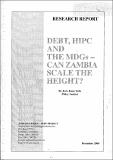December 2004 JCTR: Debt, HIPC and the MDGs- can Zambia Scale the Height

View/
Date
2004-12-30Authors
Zulu, Jack Jones
Jesuit Centre for Theological Reflection
Type
Annual ReportLanguage
enItem Usage Stats
47
views
views
11
downloads
downloads
Abstract
Zambia is among the most heavily indebted countries in Africa. The decline in copper prices and the increase in oil prices in the early 1970s led to a considerable deterioration in Zambia's terms of trade. The authorities believed that the worsening economy was a temporary phenomenon and would reverse, and therefore undertook heavy borrowings to avoid having to restructure the economy (CAS, 2004). Other heavy borrowings were made to support the political liberation struggles in Southern Africa. At US$6.5 billion in 2003 and over US$7 billion in 2004, Zambia has one of the highest per capita debts and is one of the most highly indebted countries in the world. Zambia's debt stock increased rapidly during the 1980s, rising from US$3.3 billion in 1980 to US$6.9 billion in 1990. However, the external debt stock in 2002 had reduced to US$6.5 billion mainly due to debt relief and debt repayments. The current high debt levels can be attributed, among other things, to new and increased government borrowings.
Description
One way of effectively analyzing poverty in Zambia is to take a hard look at the Jesuit Center for
Theological Reflection (JCTR) basic needs basket. The JCTR through its monthly Basic Needs Basket (BNB) report (a measure of the cost of living for a family of six in Lusaka and other selected rural and urban centers), has over the years shown heightened hardships particularly among the poor and vulnerable groups occasioned by price increases in food and essential non-food items necessary for decent human survival.